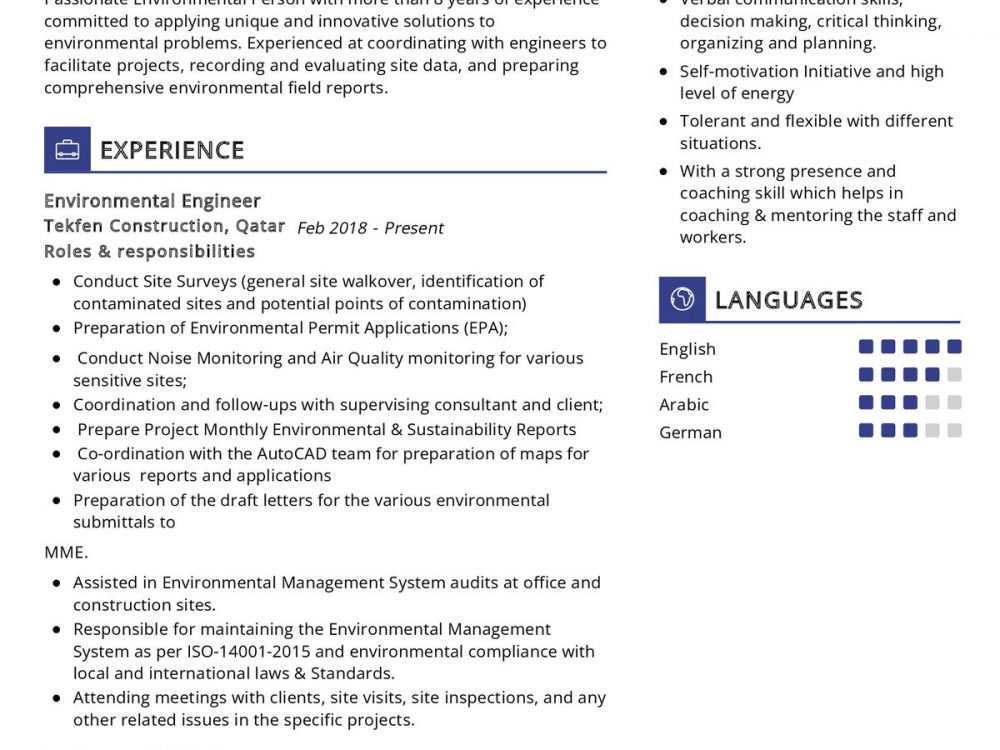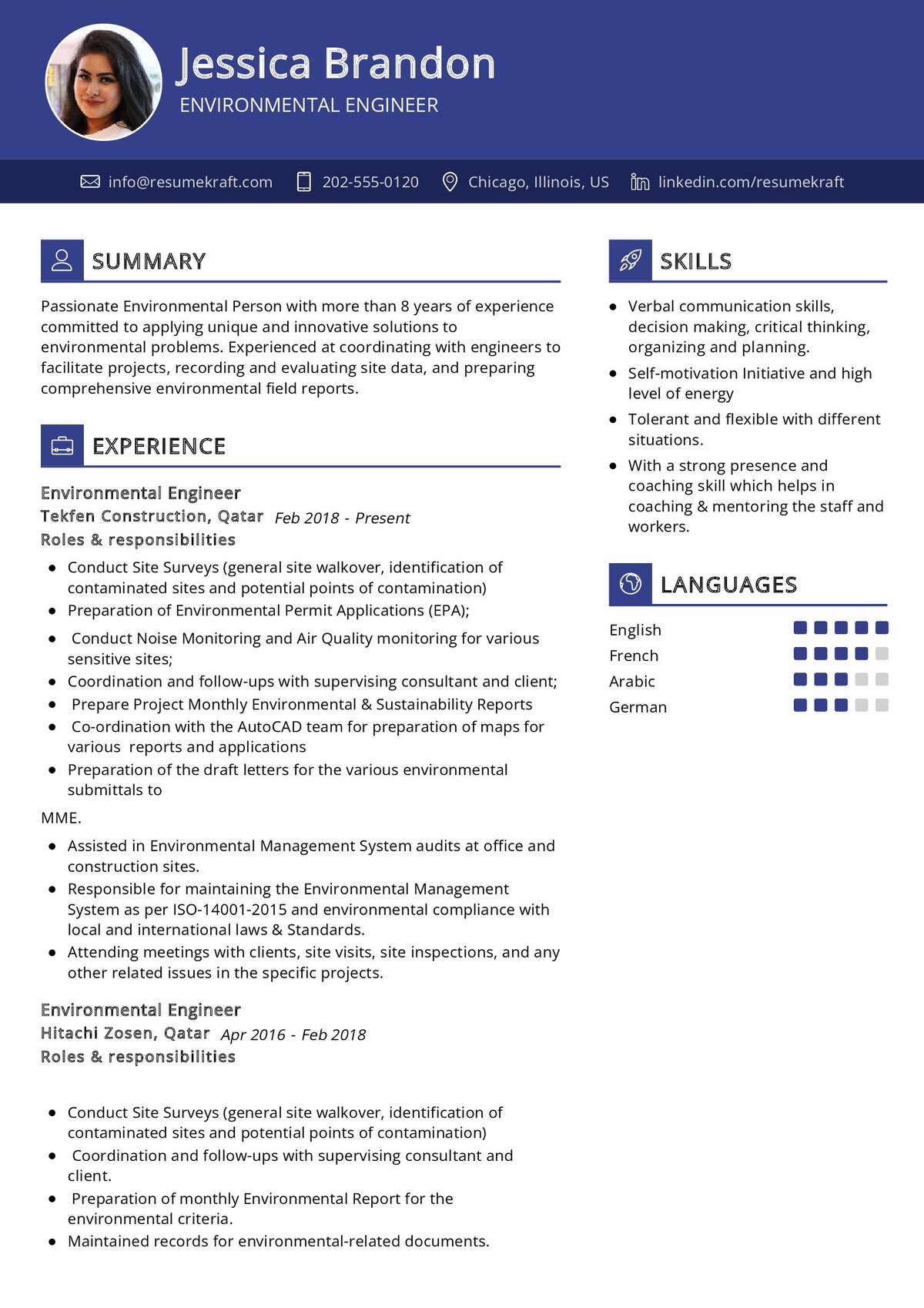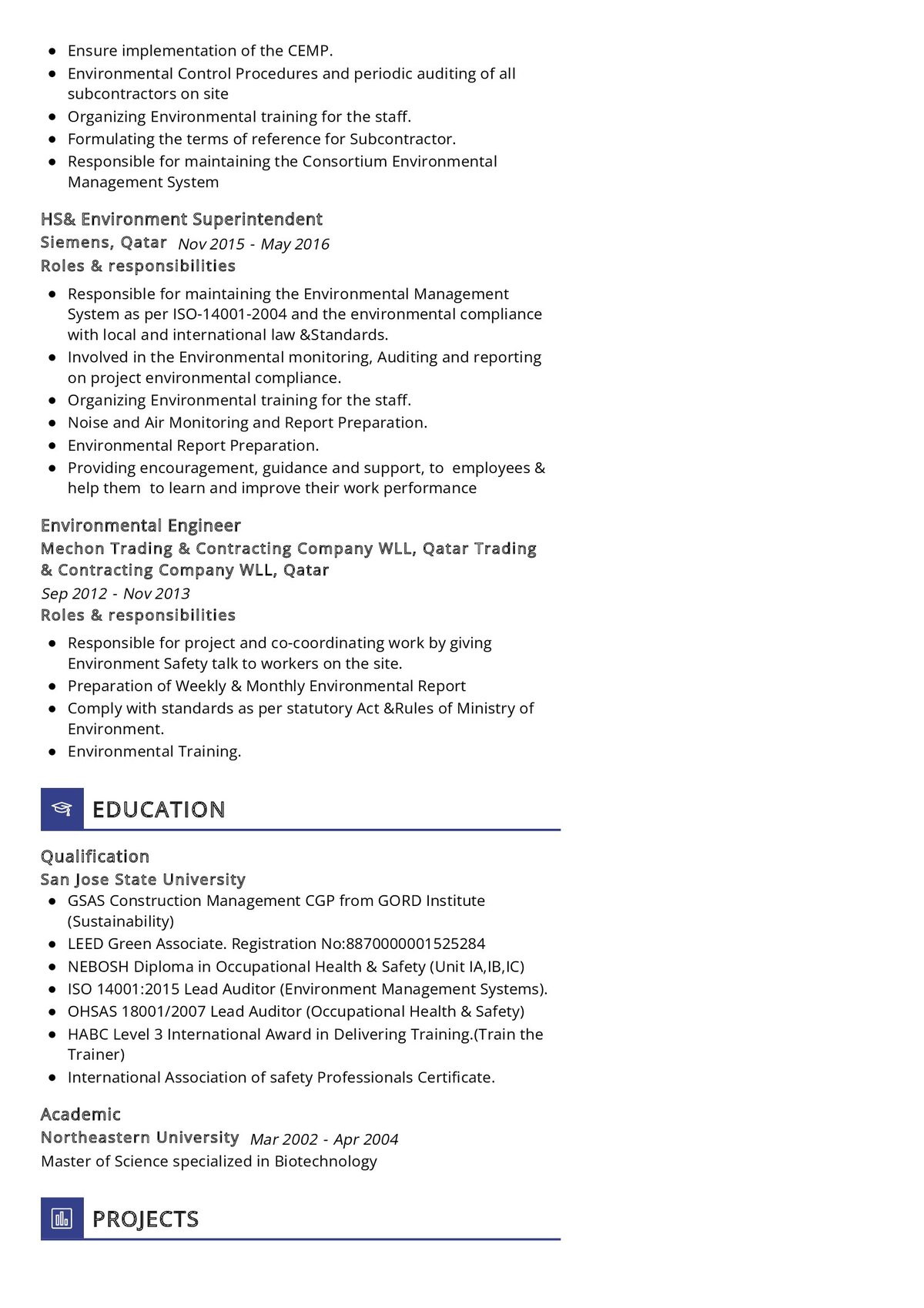What Should Be Included In A Environmental Engineer Resume?
When it comes to creating an environmental engineer resume, there are a few key points to keep in mind. First and foremost, it is important to remember that environmental engineering is a highly specialized field. As such, your resume should be tailored to reflect your unique abilities and expertise in this particular discipline.
Including the right information in your environmental engineer resume is essential to get the attention of potential employers. The following sections should always be included:
- Education: A comprehensive list of your educational qualifications and any relevant environmental engineering courses or certifications.
- Work Experience: Include any prior work experience related to environmental engineering, such as internships or volunteer work.
- Technical Skills: Highlight any technical skills related to environmental engineering that you have acquired through your job experience or through academic studies.
- Specialized Knowledge: This section should discuss any specialized knowledge and skills you have acquired through your career, such as the ability to read and interpret data or knowledge of industry-specific regulations.
- Professional References: Include the contact details of any professional references who can vouch for your skills and qualifications.
Finally, make sure your environmental engineer resume is well-structured, with clear and concise language. This will make it easier for employers to understand the information you are conveying, and will also help you stand out from other applicants.
What Skills Should I Put On My Resume For Environmental Engineer?
As an environmental engineer, you have a variety of skills at your disposal. In order to make the best impression on potential employers, you need to showcase those skills on your resume. When writing your resume, you should be sure to include the most important skills for environmental engineers. These include technical skills, problem-solving skills, and knowledge of specific regulations.
Starting with technical skills, environmental engineers need to have a deep understanding of both natural and built environments. This means they should understand the principles of engineering and be able to apply them to their work. They should also be familiar with the different types of technology used in environmental engineering, such as GIS systems, CAD software, and wastewater treatment systems.
Problem-solving skills are also essential for environmental engineers, since they often must identify solutions to complex problems related to water, air, and soil pollution. Not only should they be able to analyze data and identify trends, but they should also be able to design and implement effective solutions.
Finally, environmental engineers must have a thorough knowledge of environmental regulations, such as the Clean Water Act, the Clean Air Act, and the Endangered Species Act. They should also have a good understanding of the policies and procedures related to environmental protection.
By ensuring that your resume reflects these three key skills, you can rest assured that employers will take notice. Make sure to include any relevant experience or certifications that demonstrate your expertise in these areas. With the right combination of skills, you can make a strong case for why you are the ideal candidate for the job.
What Is The Job Description Of The Environmental Engineer?
Environmental engineers play an important role in protecting the environment, with their jobs focused on designing solutions to environmental problems. They are required to analyze the environment, identify potential environmental hazards and develop ways to protect against them. One of the main responsibilities of environmental engineers is to create plans and designs for environmental protection and pollution control, taking into account the latest scientific and public health research. They must also ensure that these plans comply with the applicable environmental regulations.
In addition, environmental engineers are responsible for the proper installation and operation of environmental protection systems, and for monitoring the environment on a regular basis. Furthermore, they may provide technical assistance to other professionals and conduct research to improve the efficiency and effectiveness of environmental protection systems.
What Is A Good Objective For A Environmental Engineer Resume?
An objective statement is an essential part of a strong environmental engineer resume. It should concisely and clearly state what your goals are as an environmental engineer. A good objective should reflect your qualifications, skills, and experience that make you a suitable candidate for the job. It should also include any special qualifications or skills that you possess that could make you a great asset to the company.
When writing an objective statement for an environmental engineer resume, it is important to be specific and include measurable objectives. For example, a good objective for an environmental engineer might be: “Seeking to use my 5+ years of experience in environmental engineering to develop innovative solutions for reducing water and energy consumption, as well as cutting waste and emissions.”
Another effective objective statement for an environmental engineer resume might be: “Seeking to use my knowledge of green engineering and sustainable design principles to help organizations achieve their environmental goals.” This statement clearly states your qualifications and goals, while also emphasizing your commitment to environmental sustainability.
No matter what type of environmental engineer resume objective you choose, it is important to make sure that it is clear and concise. An effective objective should also be tailored to the individual job you are applying for. Remember to include specific skills, qualifications, and experience that align with the job you are applying for. A well-crafted objective statement can make your resume stand out and make it easier for employers to understand your qualifications.
What Are The Career Prospects In The Environmental Engineer?
The career prospects for those interested in environmental engineering are extremely promising. Environmental engineering encompasses the application of science and engineering principles to solve environmental problems. It is an interdisciplinary field that combines aspects of engineering, biology, chemistry, geology, hydrology, ecology, and public health. Environmental engineers have the unique and important role of helping protect our natural resources and the environment, while ensuring that human activities are in compliance with governmental regulations.
Those interested in becoming an environmental engineer will find a wide array of career opportunities, including positions in industry, government, and academia. The job outlook for environmental engineers is very favorable, with a projected growth of nearly 11% over the next decade. The median salary for environmental engineers ranges from $68,000 to $109,000, depending on the industry and job location.
In addition to their salaries, environmental engineers often receive additional benefits, such as paid holidays and vacations, health insurance, and retirement plans. There is also the potential for advancement in the field, depending on an individual’s level of experience and qualifications. Environmental engineers can advance to higher levels of responsibility and may even become directors of engineering departments or project managers.
The career prospects for environmental engineers are promising, and with the constant need to protect our environment, the demand for qualified individuals is expected to remain high. With the right education and experience, environmental engineers can have successful and rewarding careers.
Key Takeaways for an Environmental Engineer resume
When it comes to crafting an effective Environmental Engineer resume, there are several key points to consider. Below are some of the key takeaways to keep in mind when writing your resume.
First and foremost, be sure to highlight your technical expertise. As an Environmental Engineer, it is important to showcase your knowledge of environmental science and engineering principles. Include your qualifications, certifications, and any special training you have that relates to the role you are applying for.
Next, be sure to showcase your experience. Environmental Engineers should be able to demonstrate that they have the necessary skills to design, install, and maintain environmental protection systems. Include any relevant projects or systems you have worked on, as well as any successes or challenges you have encountered in the course of your work.
In addition, emphasize your leadership skills. Environmental Engineers often need to manage teams, coordinate resources, and balance multiple tasks. Showcase your ability to multitask, delegate tasks, and motivate others.
Finally, when putting together your resume, remember to focus on the job description. Be sure to include information that is relevant to the position you are applying for, and tailor it to the specific requirements outlined by the employer. By taking the time to customize your resume, you can ensure that your unique skills and qualifications stand out from the rest of the pack.



